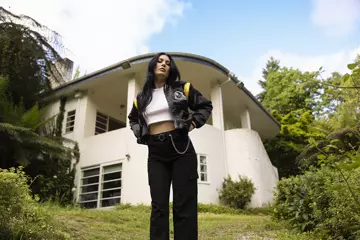Given Robert B Weide produced 53 and directed 27 episodes of Larry David's legendary sitcom, perhaps it's no surprise he sees the world through it. “On Curb Your Enthusiasm, we did an episode that dealt with the question of whether somebody was shy, or if they were an asshole,” Weide offers. He's talking about the subject of his latest picture, Woody Allen: A Documentary. “That's a question that comes up anytime someone's a kind of stand-offish, and Woody is but in his case it's because he's really shy. Scarlett Johansson described him as being 'cripplingly shy'. It's true, and he's been that way since he was a kid. But we fell into a really great rapport right away.”
Weide has made, by his own estimation, a career out of chronicling his heroes; spending the last 30 years documenting people he first grew obsessed with in his youth. “These are all my cultural and artistic heroes, all of them discovered in my adolescent teen years,” Weide says, of the celebrity-studies that consist oeuvre. “The Marx Brothers, Lenny Bruce, WC Fields, Lenny Bruce, Mort Sahl, Woody Allen. These are very important subjects to me.”
Weide's attraction to Allen was sparked when he saw Take The Money & Run as a nine-year-old, and took hold forever when Annie Hall was released when he was in high-school. “I got to grow up with his work; it was maturing as I was maturing,” Weide smiles.
He first interviewed Allen when making 1982's TV documentary The Marx Brothers In A Nutshell, and soon Weide wanted to document Allen himself. “I made my first approach to him in the mid-'80s, he politely declined,” recounts Weide. “I went back to him in the mid-'90s, he politely declined. Then, in October 2008, I wrote him a letter and pressed him on it, [but] he was convinced that no one would ever want to finance it, put it on a screen, or even watch it.”
Don't miss a beat with our FREE daily newsletter
Once Allen agreed to the project, Weide set about chronicling a singular figure; which meant going beyond the myth (“there's nothing that really jumps out as particularly weird or quirky or eccentric about him,” Weide offers, “like, he's certainly not some crazed neurotic, he's almost always very calm”) whilst showing due reverence for a vast, uncompromising body-of-work.
“The phrase 'independent filmmaker' is rarely attributed to Woody Allen, yet he might be the most independent filmmaker in all of American cinema. Even the people who finance his films don't even see scripts, they just want to be in the Woody Allen business; I can't think of anyone else who works in a comparable situation. It's unprecedented in American filmmaking, for one film let alone 40, and for me that makes for a fascinating career arc.”
Woody Allen: A Documentary goes behind the scenes of the little-seen You Will Meet A Tall Dark Stranger (“it did no business at the box-office whatsoever”), then stumbles into the perfect end when its successor, Midnight In Paris, becomes Allen's biggest-ever picture. “By accident, we suddenly got this unexpected uplift at the end of the film,” Weide says. “It was too perfect: at 76 years old, after 43 films, this guy's suddenly had the biggest success of his career. It was the happy ending that we were never seeking.”
WHAT: Woody Allen: A Documentary
WHEN & WHERE: Wednesday 6 June, 6pm, Event Cinemas George 9. Monday 11 June, 9.30am, State Theatre















